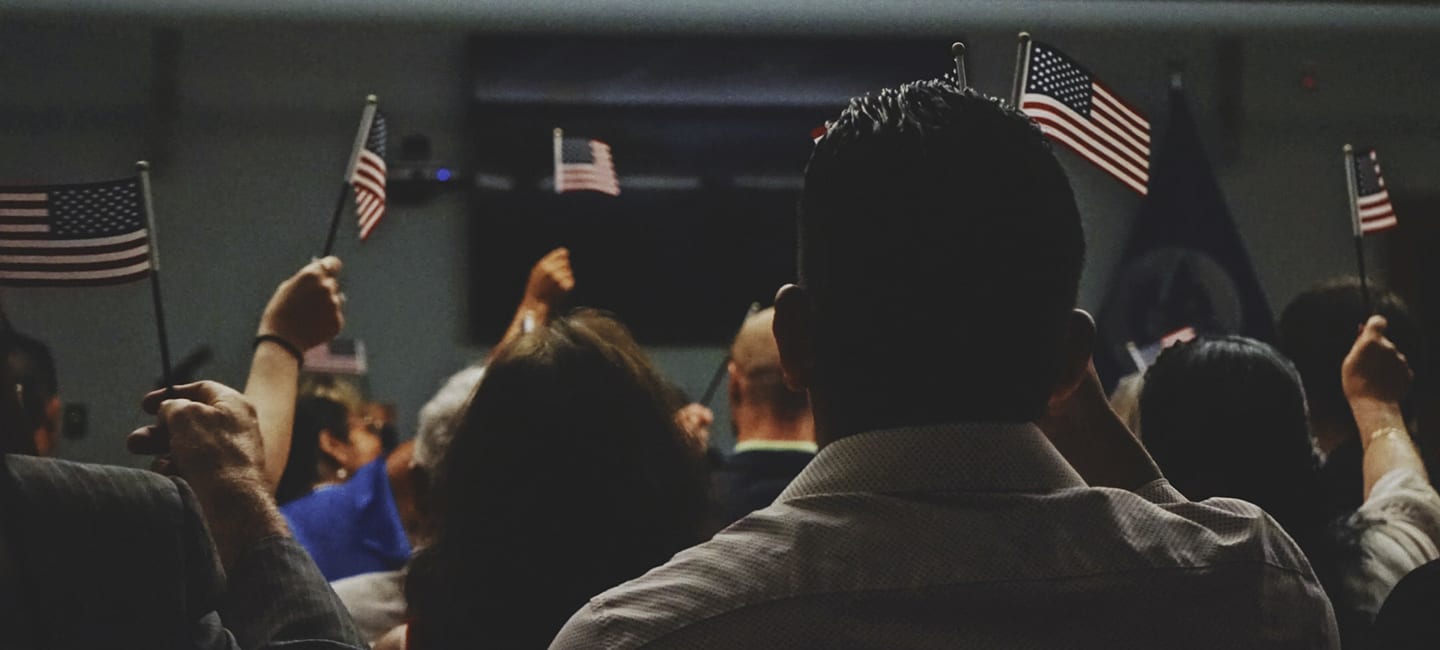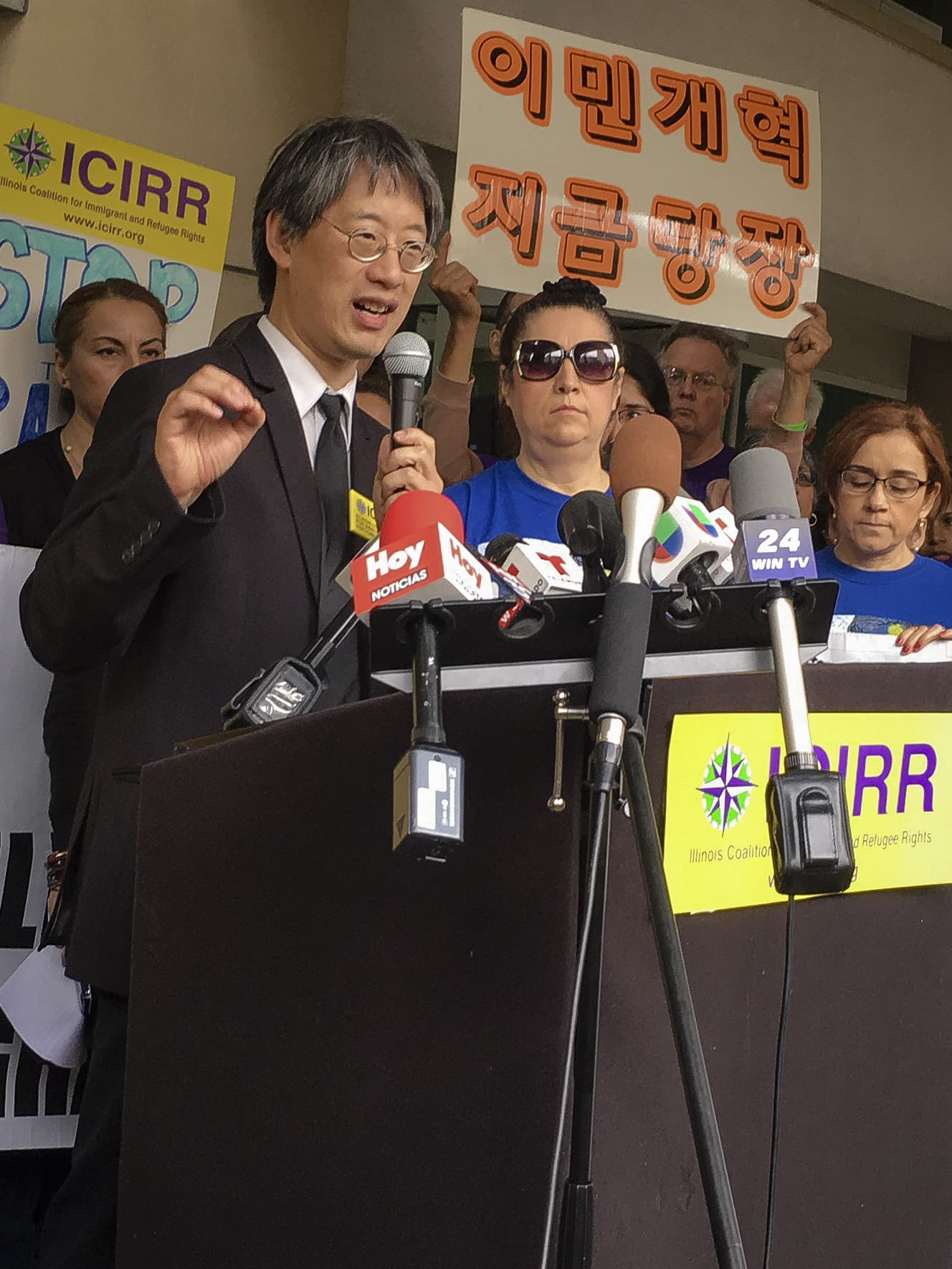
El defensor de los inmigrantes Fred Tsao reacciona al nuevo veto migratorio de Trump y comparte sus esperanzas de un futuro mejor.
Arriba: Foto de Elías Castillo en Unsplash.
El presidente Donald Trump anunció un nueva prohibición de inmigración Martes por la noche. Cualquier persona que solicite una tarjeta verde tendrá que esperar al menos 60 días hasta que se levante la prohibición temporal.
El anuncio siguió a un tuit a última hora de la noche del lunes en el que Trump dijo que firmaría una orden ejecutiva "para suspender temporalmente la inmigración en Estados Unidos" con el fin de frenar la propagación del COVID-19.
La inmigración ya se ha paralizado en Estados Unidos debido a la pandemia de coronavirus y a las medidas que ha tomado la administración Trump para frenar tanto las admisiones de refugiados como la tramitación del asilo.
A la luz de la nueva orden ejecutiva, Borderless Magazine preguntó a Fred Tsao, asesor político principal de la Coalición de Illinois por los Derechos de los Inmigrantes y Refugiados (ICIRR))cómo afectará a la gente el último veto migratorio de Trump.
Revista Borderless: ¿Cómo encaja la última prohibición en el marco más amplio de las políticas de Trump con respecto a la inmigración y el manejo de su administración de la pandemia de coronavirus?
Fred Tsao: Dice más de él y de su mentalidad que de las necesidades reales de este país. En lugar de seguir intentando identificar recursos de prueba y movilizar a las industrias clave para que produzcan recursos para la atención sanitaria, está intentando jugar con su base y seguir demonizando a los inmigrantes.
Nuestro país tiene una larga tradición, algo desigual, pero realmente orgullosa, de acoger a personas que buscan seguridad. Eso no quiere decir que las personas que intentan venir aquí no deban someterse a un control sanitario o que no debamos tomar medidas para asegurarnos de que no van a suponer un peligro, porque absolutamente debemos hacerlo.
Pero cerrar las cosas por completo es una reacción exagerada y peligrosa ante la amenaza.
Si pensamos en cerrar nuestra frontera sur, tenemos muchos más casos de COVID en Estados Unidos que en México. De hecho, estamos exportando el coronavirus a países en América Central.
No perdamos de vista a las personas que intentan ponerse a salvo o reunirse con sus familias viniendo aquí. O, para el caso, personas que desempeñan funciones clave en nuestra economía.
Sin fronteras: ¿Cómo ha afectado la pandemia de COVID-19 a los inmigrantes aquí?
Tsao: La pandemia ha puesto de manifiesto muchas disparidades en nuestra sociedad. Una de las más importantes es el excesivo porcentaje de casos y víctimas mortales entre nuestras comunidades de color: afroamericanos, latinos y, en cierta medida, también asiáticos.

Fred Tsao habla en una rueda de prensa frente a la oficina del Servicio de Inmigración y Control de Aduanas el 23 de junio de 2016 en Chicago, Illinois. Foto cortesía de ICIRR.
Además, muchas familias inmigrantes están excluidas de muchas de las medidas adoptadas por el gobierno federal para aliviar la situación. Las familias de estatus mixto y las familias indocumentadas se quedan fuera de los pagos del IRS. En general, los trabajadores indocumentados no tienen derecho a percibir prestaciones de desempleo. El sitio regla de la carga pública sigue causando confusión entre los inmigrantes que deseen someterse a las pruebas COVID-19 o recibir atención sanitaria.
La gente está sufriendo. No tienen trabajo ni ingresos. Y, sobre todo entre los inmigrantes indocumentados, no hay ayuda disponible. Así que la pregunta que nos hacemos es: ¿Cómo pueden unirse las comunidades para ayudar a quienes no pueden valerse por sí mismos en ese momento? ¿Podemos poner en común nuestros recursos? Si una persona no necesita el pago de Hacienda, ¿puede donarlo para ayudar a los demás? Este es el tipo de cosas que nos rondan por la cabeza.
Sin fronteras: El mes pasado, el ICIRR lanzó el "Campaña "Todos dentro en respuesta a la pandemia. ¿Cuál es su objetivo?
Tsao: Gran parte de nuestro pan de cada día es abogar por políticas sólidas y favorables a la inmigración. Sabíamos que necesitábamos dar una respuesta a todos los niveles de gobierno para ayudar y apoyar a los inmigrantes en estos momentos. Algunas de las ideas son bastante obvias, como el aumento del acceso a las pruebas y el tratamiento del COVID-19. Otras pueden no ser tan claramente pertinentes. Otras pueden no ser tan claramente pertinentes, pero son importantes. Por ejemplo, prorrogar los estatutos de los inmigrantes y los permisos de trabajo durante el cierre de los servicios de inmigración.
También abogamos por la liberación segura del mayor número posible de personas detenidas por motivos de inmigración y bajo custodia penal. para prevenir la propagación del coronavirus. Detenemos a demasiada gente. La mayoría de las personas detenidas por motivos de inmigración, si no todas, no necesitan estar allí. Los únicos que realmente se benefician del sistema de detención son las empresas privadas de prisiones y las cárceles que cobran por alojar a los detenidos.
Muchas de las personas detenidas pueden ser devueltas a sus comunidades y a sus familias de forma segura o se les puede proporcionar cobijo a través de otros mecanismos que atiendan realmente a sus necesidades en lugar de limitarse a encerrarlas.
Sin fronteras: ¿Qué le da esperanza en estos momentos difíciles?
Tsao: La gente se acerca y quiere ayudar a quienes lo necesitan y son menos afortunados. Todas nuestras organizaciones miembros han pasado a trabajar a distancia, por lo que no pueden ver a los clientes en sus oficinas, pero siguen en contacto con ellos. Siguen asistiendo a las comunidades e intentando impartir clases y ayudar a la gente a rellenar sus papeles de inmigración y sus solicitudes de ciudadanía. A pesar de todos los obstáculos que existen ahora, el trabajo continúa.
También me anima ver a tanta gente participando en nuestro día de acción virtual. Que están deseando empezar a planificar nuestro trabajo electoral en otoño o mantener la labor de difusión del censo que sigue en marcha.
No estamos llamando a las puertas en los barrios. Pero muchos de nuestros socios del censo están organizando bancos de teléfonos, campañas en las redes sociales y otras formas de divulgación. Si las cifras de respuesta al censo son indicativas, ese trabajo ha dado sus frutos. Eso también me da esperanzas.
Por último, esta es una oportunidad para soñar en grande. Podemos imaginar una sociedad más compasiva que ofrezca un apoyo real y profundo a las personas necesitadas. Que esté dispuesta a analizar en profundidad la disparidad racial y económica. Tenemos que estar dispuestos a arremangarnos para solucionar estos problemas subyacentes y no excluir a nadie por motivos de raza, etnia o situación económica. Como sociedad, tenemos que darnos cuenta de que todo el mundo debería estar incluido.
Fred Tsao se unirá a la Directora Ejecutiva de Borderless Magazine, Nissa Rhee, el próximo lunes 27 de abril en una conversación sobre inmigración organizada por New America y The Chicago Community Trust. RSVP para el evento virtual aquí.
¿Tiene preguntas sobre el coronavirus y cómo protegerse de COVID-19? Lea la guía de los CDC sobre el coronavirus aquí.
Apóyanos

